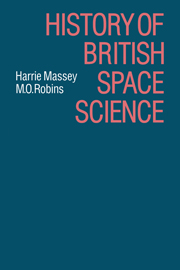Book contents
- Frontmatter
- Contents
- Glossary of abbreviations in text and annexes
- Glossary of abbreviations in appendices
- Preface
- 1 The scientific background
- 2 The technical background
- 3 The initiation of the Skylark rocket programme – the IGY and artificial satellites
- 4 Post-IGY developments – NASA – COSPAR – British National Committee for Space Research – British satellite experiments
- 5 The Ariel programme
- 6 The European Space Research Organization
- 7 Commonwealth co-operation in space reseach
- 8 Smaller rockets for scientific purposes – Skua and Petrel
- 9 Attitude controlled Skylark rockets
- 10 The Trend Committee and the Science Research Council
- 11 The transformation of ESRO into ESA
- 12 The Space Science Committee for Europe
- 13 Scientific studies by British space scientists – figure of the earth and the neutral atmosphere
- 14 Scientific studies by British space scientists – the ionosphere, the magnetosphere and cosmic rays
- 15 The contribution from British space scientists to astronomy
- 16 Concluding remarks
- Appendices
- Annexes
- Notes
- Index
10 - The Trend Committee and the Science Research Council
Published online by Cambridge University Press: 05 February 2012
- Frontmatter
- Contents
- Glossary of abbreviations in text and annexes
- Glossary of abbreviations in appendices
- Preface
- 1 The scientific background
- 2 The technical background
- 3 The initiation of the Skylark rocket programme – the IGY and artificial satellites
- 4 Post-IGY developments – NASA – COSPAR – British National Committee for Space Research – British satellite experiments
- 5 The Ariel programme
- 6 The European Space Research Organization
- 7 Commonwealth co-operation in space reseach
- 8 Smaller rockets for scientific purposes – Skua and Petrel
- 9 Attitude controlled Skylark rockets
- 10 The Trend Committee and the Science Research Council
- 11 The transformation of ESRO into ESA
- 12 The Space Science Committee for Europe
- 13 Scientific studies by British space scientists – figure of the earth and the neutral atmosphere
- 14 Scientific studies by British space scientists – the ionosphere, the magnetosphere and cosmic rays
- 15 The contribution from British space scientists to astronomy
- 16 Concluding remarks
- Appendices
- Annexes
- Notes
- Index
Summary
The organization which had been set up to deal with the management and financial administration of the British space research programme had already become quite complex by the beginning of 1961 (see Chapter 4, p. 72). The impact of the negotiations for the establishment of the European Space Research Organization (ESRO) threw a greatly increased burden on the system and it was clear that, before long, some substantial modifications would be necessary. This matter was a subject of frequent discussion between R. Quirk, H.S.W. Massey and M.O. Robins, the establishment of the Space Research Management Unit (SRMU) (see Chapter 5, p. 93) being one consequence. However, in 1962 the government set up a committee to examine the whole question of the organization of the support for civil science in Britain. Pending the issue of a report by this committee it was not worthwhile to consider any major changes specifically concerned with space science.
The Trend Committee
The Committee was set up under the Chairmanship of Sir Burke Trend, Second Secretary at the Treasury, the other members being Sir Keith Murray, Chairman of the University Grants Committee; Sir Thomas Padmore, Second Secretary at the Treasury; Lord Todd, Chairman of the Advisory Council on Scientific Policy; F.F. Turnbull, Secretary, Office of the Minister for Science; C.H. Waddington, Professor of Animal Genetics, University of Edinburgh and E.G. Woodroofe, Director, Unilever Ltd.
- Type
- Chapter
- Information
- History of British Space Science , pp. 210 - 224Publisher: Cambridge University PressPrint publication year: 1986



